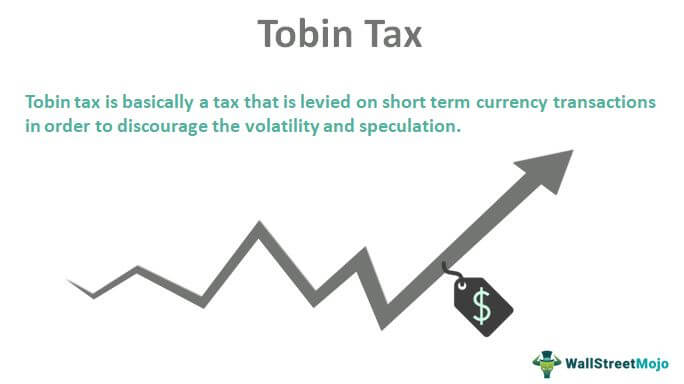Table Of Contents
Tobin Tax Definition
Tobin Tax is a tax levied on short-term currency transactions to discourage volatility and speculation. This is to ensure that the market remains stable and active all the times. When taxes are levied, it is likely for the traders to refrain from engaging in such short-term trade, thereby serving the purpose.

Tobin tax was primarily introduced as the tax payable on the spot transactions involving the conversion of one currency to another. Through this tax, foreign exchange transactions began happening at a uniform but comparatively lower rate. In short, this tax aimed at improving the flow of money in the market, favoring long-term transactions.
Tobin Tax Explained
Tobin tax is generally levied on short-term currency transactions. This levy controls the money that moves in financial markets in favor of high short-term interest rates. During periods of global crisis, many countries have introduced these taxes to control short-term capital flows. Usually, in the short-term market, the quick inflows and outflows will make it challenging to manage central banks. So, the levy of Tobin tax could discourage the volatility & control the speculative capital flows or hot money. Tobin Tax burden is inversely proportional to the period or the length of the transaction. If the holding period is short, the tax burden will be higher & if the holding period is more extended, the tax burden will be lesser.
History
An American macroeconomist and a Nobel Laureate, James Tobin, first proposed the Tobin tax. When the Bretton Woods exchange rate system collapsed, fixed exchange rates were replaced with a volatile floating exchange rate. To reduce this volatility, a small tax was levied on every amount of currency exchanged into another. This tax is to stop the destabilization of capital flows across the borders & manage exchange rate volatility. It is to discourage the short-term speculation of the currencies.
Tobin believed that several problems could be created for small countries because of the massive inflow and outflow of different currencies where they would have to increase the interest rates to keep their currency moving out of their country. Still, high-interest rates could affect local economic activities. This tax was ignored for many years, but people took an interest in it during the Asian Financial crisis. So, it could generate stability in currency markets suffering from disturbances due to the collapse of the Bretton Woods exchange rate.
Example
Let us consider the following example to understand what is Tobin tax and how it works:
Sweden tried the Tobin tax in 1984. They levied a tax of 0.5% on buying and selling of shares. They could not achieve the results. Sweden could only raise 50 million Swedish Kronors against the expectation of 1.5 billion. In the 1st week of the tax itself, the trading volume of bonds fell by 85%. Later it was scrapped in 1991. Italy imposed a tax on high-frequency trading of shares in September'13. They imposed a 0.02 % tax on all the trades occurring every 0.5 seconds or faster. In 2016, 11 European countries proposed the financial transaction tax, where they would levy 0.1 percent tax on shares and bonds & 0.01 percent tax on derivative transactions. This approach gave mixed results in many countries that tried it, like Chile, Malaysia & Thailand.
Implementation
Implementing the Tobin tax was difficult if an individual country made it. So, it was felt that an international organization could manage and implement it. It has to be internationally agreed to make it work effectively. Regarding the determination of the optimum tax rate, some say that if it is too high, that will weaken the financial markets, and if it is too low, it won’t achieve its aim. It could impair the international financial markets operations & create liquidity problems. Exemptions could be provided to certain funds like pension funds etc. Of the total trade volume of currency traded daily, only 5% of the transactions are related to trade and are real economic transactions. The other 95% are speculative transactions. These speculations can create havoc in national budgets, Economic planning, etc.
Pros
With the Tobin tax, the market is stable and it remains ideally active all the time. This is what its purpose has been. However, there are multiple other benefits that the Tobin tax offers. Some of them have been listed below:
- The tax burden discourages the inflow of short-term speculative capital or hot money.
- In case of any destabilizing effects of the capital flows, the government or the central bank will get some gestation time to think of and take necessary measures to counter them.
- This tax could reduce financial markets' power over the national governments in determining their fiscal and monetary policies.
- It forms a part of the revenue for the government.
- It will emphasize that investors should look more into macroeconomic fundamentals.
Cons
Besides a number of advantages, there are a few limitations related to these taxes. Traders must be aware of them before ignoring long-term transactions despite these taxes being levied.
- It could result in fewer financial transactions that are being made, which could result in job losses.
- Because of taxes, many funds like pension funds get lesser returns as the banks would pass the cost of the taxes to the customers.
- It increases the cost of capital for investors.
- Liquidity for the assets will experience a decline.
The areas of implementation of the Tobin tax that determine its effectiveness are establishing a tax base, identifying taxable transactions, determining tax rates, and distributing tax revenues. To limit the financial market distortions, a base for any tax on international financial transactions should be as broad as possible. Tobin tax can be said as a compromise between totally free and strongly regulated global financial markets.
